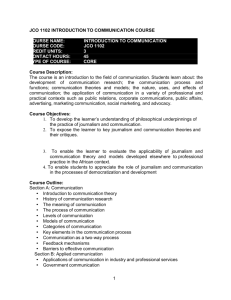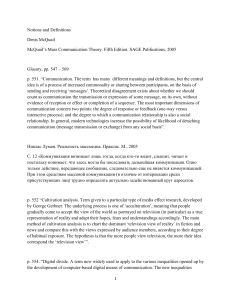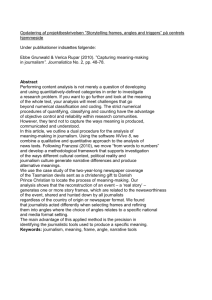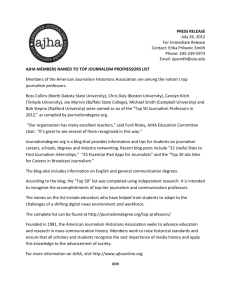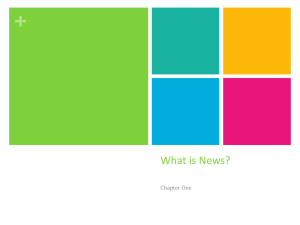JRN 120 Principles of American Journalism
advertisement
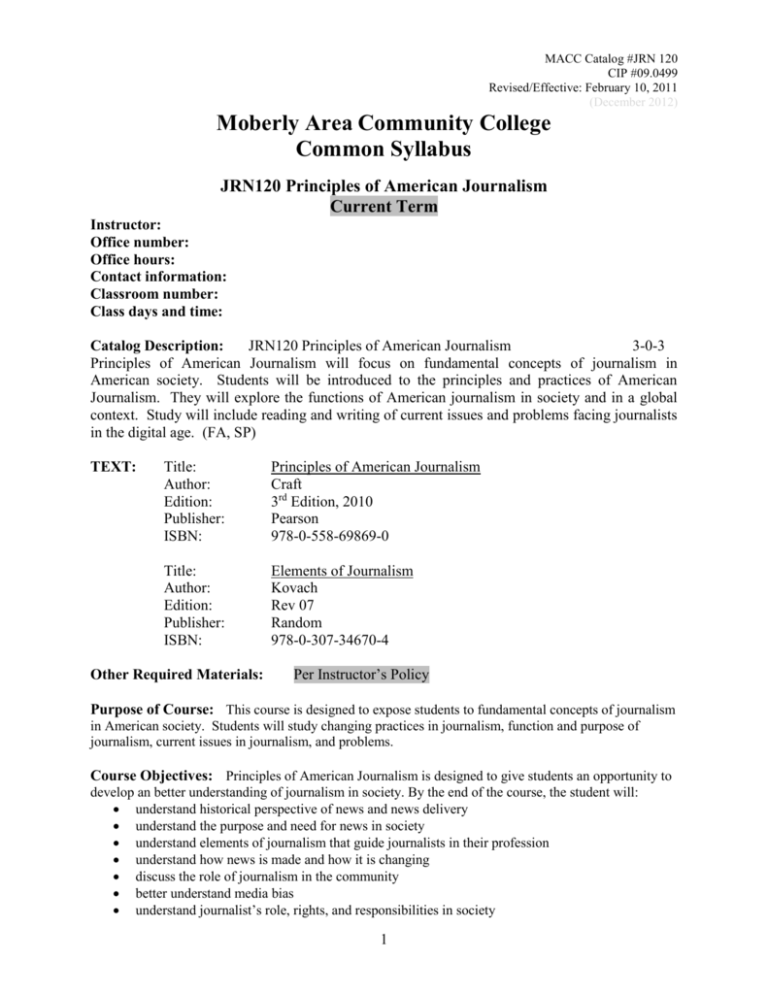
MACC Catalog #JRN 120 CIP #09.0499 Revised/Effective: February 10, 2011 (December 2012) Moberly Area Community College Common Syllabus JRN120 Principles of American Journalism Current Term Instructor: Office number: Office hours: Contact information: Classroom number: Class days and time: Catalog Description: JRN120 Principles of American Journalism 3-0-3 Principles of American Journalism will focus on fundamental concepts of journalism in American society. Students will be introduced to the principles and practices of American Journalism. They will explore the functions of American journalism in society and in a global context. Study will include reading and writing of current issues and problems facing journalists in the digital age. (FA, SP) TEXT: Title: Author: Edition: Publisher: ISBN: Principles of American Journalism Craft 3rd Edition, 2010 Pearson 978-0-558-69869-0 Title: Author: Edition: Publisher: ISBN: Elements of Journalism Kovach Rev 07 Random 978-0-307-34670-4 Other Required Materials: Per Instructor’s Policy Purpose of Course: This course is designed to expose students to fundamental concepts of journalism in American society. Students will study changing practices in journalism, function and purpose of journalism, current issues in journalism, and problems. Course Objectives: Principles of American Journalism is designed to give students an opportunity to develop an better understanding of journalism in society. By the end of the course, the student will: understand historical perspective of news and news delivery understand the purpose and need for news in society understand elements of journalism that guide journalists in their profession understand how news is made and how it is changing discuss the role of journalism in the community better understand media bias understand journalist’s role, rights, and responsibilities in society 1 MACC Catalog #JRN 120 CIP #09.0499 Revised/Effective: February 10, 2011 (December 2012) Course Content: I. II. III. IV. V. VI. VII. VIII. IX. X. Elements and principles of journalism in American society Changes in news and news delivery Purpose and function of news in a democratic society Journalist’s role and responsibilities to its citzens The citizen’s role in a democratic society Who pays for journalism Journalism’s unique position in society Media bias Sources and Online Research Current issues as it relates to journalism Assessment of Student Learning: The grading scale will follow a standard of 100%-90% A, 89-80% B, 79-70% C, 69-60% D. Course will include the following activities: Readings / Quizzes (approx. 150 pts.) Activities and written projects (approx. 100 pts.) Threaded discussions (approx 50 pts) Tests (approx 300 pts) Approximate points possible – 600 Description of Major Assignment(s)/Project(s): 1. 2. 3. 4. Activities: Writing Assignments and Projects: Midterm and Final: Exams will cover text and lecture material. Quizzes: Statement to Connect Course with General Education Outcomes or Technical Education Outcome Statement: In compliance with MACC’s (Insert Program Name) Program Assessment Plan, the student who successfully completes this course will be able to meet the following Program Objectives: Instructor Policies: Attendance Policy: Any student who misses two consecutive weeks of class during a regular sixteen-week semester or the equivalent proportion of class time during a shorter session will be dropped from the class by the instructor unless acceptable justification is supplied. Additionally, any student who misses more than one-fourth of the entire number of in-seat class meetings in a regular 16-week semester or the equivalent proportion of class time during a shorter session, may be dropped from that class by the instructor if, in the opinion of the instructor, the student does not have reasonable opportunity to succeed in the class. A student’s attendance rate will be calculated based upon the first day of the semester (not the student’s date of enrollment in the course). Student attendance must be defined in a different manner for online, hybrid, and virtual courses. Student attendance in these courses is defined as active participation in the course. Online, 2 MACC Catalog #JRN 120 CIP #09.0499 Revised/Effective: February 10, 2011 (December 2012) hybrid, and virtual courses will, at a minimum, have weekly mechanisms for student participation, such as any or all of the following methods: a. Completion of quizzes or exams b. Submission of assignments c. Participation in threaded discussions d. Communication with the instructor A student who does not participate in an online, hybrid, or virtual course for two consecutive weeks will be dropped by the instructor unless acceptable justification is supplied. As with ground courses, a student’s attendance rate in online courses will also be calculated based upon the first day of the semester. If a student does not demonstrate active participation in the online course within the first two weeks (or the equivalent proportion of class time during a short session), the student will be dropped as “never attended.” Simply logging into an online class does not constitute active participation. Students should be aware that their dropping a course and their last date of attendance in the course may impact their financial aid. (Policy Handbook I.090 and M.095) Tardiness: Per instructor’s policy Make-up and late work: Per instructor’s policy Extra-Credit: Per instructor’s policy Schedule of Student Assignment and Activities: Instructors will identify a Student Assignment/Activities schedule. Instructors have the prerogative to construct the schedule by class periods, weeks, or an overview of topics to be covered. ADA Statement Students who have disabilities that qualify under the Americans with Disabilities Act may register for assistance through the Office of Access and ADA Services. Students are invited to contact the Access Office to confidentially discuss disability information, academic accommodations, appropriate documentation and procedures. For more information, please call either the Moberly office at (660) 263-4100 x 11240 or the Columbia office at (573) 234-1067 x 12120, or visit our web page at http://www.macc.edu/index.php/services/access-office. 3


